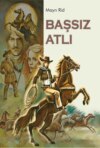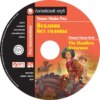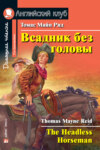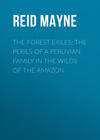Kitabı oku: «The Lone Ranche», sayfa 5
Chapter Twelve.
A Storm of Stones
Fortunately for the fugitives, the cavity into which they had crept was a shaft of but slight diameter, otherwise they could not have gone down without dropping far enough to cause death, for the echoes from the pebbles betokened a vast vertical depth.
As it was, the void turned out to be somewhat like that of a stone-built chimney with here and there a point left projecting. It was so narrow, moreover, that they were able to use both hands and knees in the descent, and by this means they accomplished it.
They went but slowly, and took care to proceed with caution. They knew that a false step, the slipping of a foot or finger, or the breaking of a fragment that gave hold to their hands, would precipitate them to an unknown depth.
They did not go farther than was necessary for quick concealment. There was noise made in their descent, and they knew that the Indians would soon be above, and might hear them. Their only hope lay in their pursuers believing them to have gone by the left hand path to the plain above. In time the Indians would surely explore both branches of the ravine, and if the cunning savages should suspect their presence in the shaft there would be no hope for them. These thoughts decided them to come to a stop as soon as they could find foothold.
About thirty feet from the top they found this, on a point of rock or ledge that jutted horizontally. It was broad enough to give both standing room, and as they were now in the midst of amorphous darkness, they took stand upon it.
The Indians might at any moment arrive on the platform above. They felt confident they could not be seen, but they might be heard. The slightest sound borne upwards to the ears of the savages might betray them, and, knowing this, they stood still, scarce exchanging a whisper, and almost afraid to breathe.
It was not long before they saw that which justified their caution – the plumed head of a savage, with his neck craned over the edge of the aperture, outlined conspicuously against the blue sky above. And soon half a dozen similar silhouettes beside it, while they could hear distinctly the talk that was passing overhead.
Wilder had some knowledge of the Comanche tongue, and could make out most of what was being said. Amidst exclamations that spoke of vengeance there were words in a calmer tone – discussion, inquiry, and conjecture.
From these it could be understood that the pursuers had separated into two parties, one following on the false track, by the path which the guide had baited for them, the other coming direct up the right and true one.
There were bitter exclamations of disappointment and threats of an implacable vengeance; and the fugitives, as they listened, might have reflected how fortunate they had been in discovering that unfathomed hole. But for it they would have already been in the clutches of a cruel enemy.
However, they had little time for reflection. The talk overhead at first expressed doubts as to their having descended the shaft, but doubts readily to be set at rest.
The eyes of the Indians having failed to inform them, their heads were withdrawn; and soon after a stone came tumbling down the cavity.
Something of this kind, Wilder had predicted; for he flattened himself against the wall behind, and stood as “small” as his colossal frame would permit, having cautioned his companion to do the same.
The stone passed without striking them, and went crashing on till it struck on the bottom below.
Another followed, and another; the third creasing Hamersley on the breast, and tearing a couple of buttons from his coat.
This was shaving close – too close to be comfortable. Perhaps the next boulder might rebound from the wall above and strike one or both of them dead.
In fear of this result, they commenced groping to ascertain if the ledge offered any better screen from the dangerous shower, which promised to fall for some time longer.
Good! Hamersley felt his hand entering a hole that opened horizontally. It proved big enough to admit his body, as also the larger frame of his companion. Both were soon inside it. It was a sort of grotto they had discovered; and, crouching within it, they could laugh to scorn the storm that still came pouring from above; the stones, as they passed close to their faces, hissing and hurtling like aerolites.
The rocky rain at length ended. The Indians had evidently come to the conclusion that it was either barren in result, or must have effectually performed the purpose intended by it, and for a short time there was silence above and below.
They who were hidden in the shaft might have supposed that their persecutors, satisfied at what they had accomplished, were returning to the plain, and had retired from the spot.
Hamersley did think so; but Walt, an old prairie man, more skilled in the Indian character, could not console himself with such a fancy.
“Ne’er a bit o’ it,” he whisperingly said to his companion. “They ain’t agoin’ to leave us that easy – not if Horned Lizard be amongst ’em. They’ll either stay thar till we climb out agin, or try to smoke us. Ye may take my word for it, Frank, thar’s some’ut to come yet. Look up! Didn’t I tell ye so?”
Wilder drew back out of the narrow aperture, through which he had been craning his neck and shoulders in order to get a view of what was passing above.
The hole leading into the grotto that held them was barely large enough to admit the body of a man. Hamersley took his place, and, turning his eyes upward, at once saw what his comrade referred to. It was the smoke of a fire, that appeared in the act of being kindled near the edge of the aperture above. The smoke was ascending towards the sky, diagonally drifting across the blue disc outlined by the rim of rock.
He had barely time to make the observation when a swishing sound admonished him to draw back his head; then there passed before his face a ruck of falling stalks and faggots. Some of them settled upon the ledge, the rest sweeping on to the bottom of the abyss.
In a moment after the shaft was filled with smoke, but not that of an ordinary wood fire. Even this would have been sufficient to stifle them where they were; but the fumes now entering their nostrils were of a kind to cause suffocation almost instantaneously.
The faggots set on fire were the stalks of the creosote plant – the ideodondo of the Mexican table lands, well known for its power to cause asphyxia. Walt Wilder recognised it at the first whiff.
“It’s the stink-weed!” he exclaimed. “That darned stink-weed o’ New Mexico! It’ll kill us if we can’t keep it out. Off wi’ your coat, Frank; it are bigger than my hunting skirt. Let’s spread it across the hole, an’ see if that’ll do.”
His companion obeyed with alacrity, stripping off his coat as quickly as the circumscribed space would permit. Fortunately, it was a garment of the sack specialty, without any split in the tail, and when extended offered a good breadth of surface.
It proved sufficient for the purpose, and, before the little grotto had become so filled with smoke as to be absolutely untenable, its entrance was closed by a curtain of broadcloth, held so hermetically over the aperture that even the fumes of Assafoetida could not possibly have found their way inside.
Chapter Thirteen.
Buried Alive
For nearly half an hour they kept the coat spread, holding it close around the edges of the aperture with their heads, hands, knees, and elbows. Withal some of the bitter smoke found ingress, torturing their eyes, and half stifling them.
They bore it with philosophic fortitude and in profound silence, using their utmost efforts to refrain from sneezing or coughing.
They knew that the least noise heard by the Indians above – anything to indicate their presence in the shaft – would ensure their destruction. The fumigation would be continued till the savages were certain of its having had a fatal effect. If they could hold out long enough, even Indian astuteness might be baffled.
From what Wilder had heard, their persecutors were in doubt about their having descended into the shaft; and this uncertainty promised to be their salvation. Unless sure that they were taking all this trouble to some purpose, the red men would not dally long over their work. Besides, there was the rich booty to be drawn from the captured waggons, which would attract the Indians back to them, each having an interest in being present at the distribution.
Thus reasoned Walt Wilder as they listened to detect a change in the performance, making use of all their ears.
Of course they could see nothing, no more than if they had been immured in the darkest cell of an Inquisitorial dungeon. Only by their ears might they make any guess at what was going on. These admonished them that more of the burning brush was being heaved into the hole. Every now and then they could hear it as it went swishing past the door of their curtained chamber, the stalks and sticks rasping against the rocks in their descent.
After a time these sounds ceased to be heard; the Indians no doubt thinking that sufficient of the inflammatory matter had been cast in to cause their complete destruction. If inside the cavern, they must by this time be stifled – asphyxiated – dead.
So must have reasoned the red-skinned fumigators; for after a while they desisted from their hellish task. But, as if to make assurance doubly sure, before taking departure from the spot, they performed another act indicative of an equally merciless intention.
During the short period of silence their victims could not tell what they were about. They only knew, by occasional sounds reaching them from above, that there was some change in the performance; but what it was they could not even shape a conjecture.
The interregnum at length ended with a loud rumbling noise, that was itself suddenly terminated by a grand crash, as if a portion of the impending cliff had become detached, and fallen down upon the platform.
Then succeeded a silence, unbroken by the slightest sound. No longer was heard either noise or voice – not the murmur of one.
It was a silence that resembled death; as if the vindictive savages had one and all met a deserved doom by being crushed under the falling cliff.
For some time after hearing this mysterious noise, which had caused the rock to tremble around them, the two men remained motionless within their place of concealment.
At length Wilder cautiously and deliberately pushed aside the curtain. At first only a small portion of it – a corner, so as to make sure about the smoke.
It still oozed in, but not so voluminously as at first. It had evidently become attenuated, and was growing thinner. It appeared also to be ascending with rapidity, as up the funnel of a chimney having a good draught. For this reason it was carried past the mouth of the grotto without much of it drifting in, and they saw that they could soon safely withdraw the curtain. It was a welcome relaxation from the irksome task that had been so long imposed upon them, and the coat was at length permitted to drop down upon the ledge.
Although there were no longer any sounds heard, or other signs to indicate the presence of the Indians, the fugitives did not feel sure of their having gone; and it was some time before they made any attempt to reascend the shaft. Some of the pursuers might still be lurking near, or straying within sight. They had so far escaped death, as if by a miracle, and they were cautious of again tempting fate. They determined that for some time yet they would not venture out upon the ledge, but keep inside the grotto that had given them such well-timed shelter. Some sulky savage, disappointed at not getting their scalps, might take it into his head to return and hurl down into the hole another shower of stones. Such a whim was probable to a prairie Indian.
Cautious against all like contingencies, the guide counselled his younger companion to patience, and for a considerable time they remained without stirring out of their obscure chamber.
At length, however, perceiving that the tranquillity continued, they no longer deemed it rash to make a reconnoissance; and for this purpose Walt Wilder crawled out upon the ledge and looked upward. A feeling of surprise, mingled with apprehension, at once seized upon him.
“Kin it be night?” he asked, whispering the words back into the grotto.
“Not yet, I should think?” answered Hamersley. “The fight was begun before daybreak. The day can’t all have passed yet. But why do you ask, Walt?”
“Because thar’s no light comin’ from above. Whar’s the bit o’ blue sky we seed? Thar ain’t the breadth o’ a hand visible. It can’t a be the smoke as hides it. That seems most cleared off. Darned if I can see a steim o’ the sky. ’Bove as below, everything’s as black as the ten o’ spades. What kin it mean?”
Without waiting a reply, or staying for his companion to come out upon the ledge, Wilder rose to his feet, and, grasping the projecting points above his head, commenced swarming up the shaft, in a similar manner as that by which he had made the descent.
Hamersley, who by this time had crept out of the grotto, stood upon the ledge listening.
He could hear his comrade as he scrambled up; the rasping of his feet against the rocks, and his stentorian breathing.
At length Walt appeared to have reached the top, when Hamersley heard words that sent a thrill of horror throughout his whole frame.
“Oh!” cried the guide, in his surprise, forgetting to subdue the tone of his voice, “they’ve built us up! Thar’s a stone over the mouth o’ the hole – shettin’ it like a pot lid. A stone – a rock that no mortal ked move. Frank Hamersley, it’s all over wi’ us; we’re buried alive!”
Chapter Fourteen.
A Savage Saturnal
Only for a short while had Wilder’s trick held the pursuers in check. Habituated to such wiles, the Indians, at first suspecting it to be one, soon became certain. For, as they scattered to each side of the cleft, the steel tube no longer kept turning towards them, while the coonskin cap remained equally without motion.
At length, becoming convinced, and urged on by the Red Cross chief and the bearded savage by his side, they dashed boldly up, and, dismounting, entered the chine over the body of the butchered horse.
Only staying to take possession of the relinquished rifle, they continued on up the ravine fast as their feet could carry them. A moment’s pause where the red kerchief lay on the rock, suspecting this also a ruse to mislead them as to the track taken by the fugitives. To make certain, they separated into two parties – one going up the gulch, that led left, the other proceeding by that which conducted to the place where the two men had concealed themselves.
Arriving upon the little platform, the pursuers at once discovered the cavity, at the same time conjecturing that the pursued had gone into it. Becoming sure of this, they who took the left-hand path rejoined them, these bringing the report that they had ascended to the summit of the cliff, and seen nothing of the two men who were chased.
Then the stones were cast in; after them the burning stalks of the ideodondo; when, finally, to make destruction sure, the rock was rolled over, closing up the shaft as securely as if the cliff itself had fallen face downward upon the spot.
The savages stayed no longer there. All were too eager to return to the waggons to make sure of their share in the captured spoils.
One alone remained – he with the bushed beard. After the others were gone he stepped up to the boulder, and, stooping down, placed his ear close to it. He appeared as if trying to catch some sound that might come from the cavity underneath.
None came – no noise, even the slightest. Within the shut shaft all was still as death. For death itself must be down there, if there ever was life.
For some time he crouched beside the rock, listening. Then rising to his feet, with a smile of satisfaction upon his grim, sinister features, he said, in soliloquy, —
“They’re down there, no doubt of it; and dead long before this. One of the two must have been he. Who the other matters not Carrai! I’d like to have had a look at him too, and let him see who has given him his quietus. Bah! what does it signify? It’s all over now, and I’ve had my revenge. Vamos! I must get back to the waggons, or my friend the Horned Lizard may be taking his pick of the plunder. Luckily these redskins don’t know the different values of the goods; so I shall bestow the cotton prints with a liberal hand, keeping the better sorts to myself. And now to assist in the partition of spoils.”
So saying, he strode away from the rock, and, gliding back down the gulch, climbed over the carcass of the dead horse. Then, finding his own outside, he mounted and rode off to rejoin his red-skinned comrades engaged in sacking the caravan.
On reaching it a spectacle was presented to his eyes – frightful, though not to him. For he was a man who had seen similar sights before – one with soul steeped in kindred crime.
The waggons had been drawn partially apart, disclosing the space between. The smoke had all ascended or drifted off, and clear sunlight once more shone upon the sand – over the ground lately barricaded by the bodies of those who had so bravely defended it. There were thirteen of them – the party of traders and hunters being in all but fifteen. Of those slain upon the spot there was not one now wearing his hair. Their heads were bare and bloody, the crown of each showing a circular disc of dark crimson colour. The scalping-knife had already completed its work, and the ghastly trophies were seen impaled upon the points of spears – some of them stuck upright in the sand, others borne triumphantly about by the exulting victors. Their triumph had cost them dear. On the plain outside at least thirty of their own lay extended, stone dead; while here and there a group bending over some recumbent form told of a warrior wounded.
By the orders of their chief, some had set about collecting the corpses of their slain comrades, with the intent of interring them. Others, acting without orders, still continued to wreak their savage spite upon the bodies of their white victims, submitting them to further mutilation. They chopped off their heads; then, poising these on the points of spears, tossed them to and fro, all the while shouting in savage glee, laughing with a cacchination that resembled the mirth of a madhouse.
Withal, there was stern vengeance in its tones. A resistance, they little expected, causing them such serious loss, had roused their passions to a pitch of the utmost exasperation; and they tried to allay their spiteful anger by expending it on the dead bodies of those who, while living, had so effectually chastised them. These were slashed and hacked with tomahawks, pierced with spears, and arrows, beaten with war clubs, then cut into pieces, to be tied to the tails of their horses, and dragged in gallop to and fro over the ground. For some time this tragical spectacle held play. Then ensued a scene savouring of the ludicrous and grotesque.
The waggons were emptied of their contents, while the rich freight, transported to a distance, was spread out upon the plain, and its partition entered upon – all crowding around to receive their share.
The distribution was superintended by the Horned Lizard, though he with the beard appeared to act with equal, or even greater, authority. Backed by the second personage, who wore hair on his cheeks, he dictated the apportionment.
And as he had said in soliloquy, the cotton prints of gaudy patterns satisfied the cupidity of his red-skinned companions, leaving to himself and his confidential friend the costlier fabrics of silken sheen. Among the traders’ stock were knives of common sort – the cheapest cutlery of Sheffield; guns and pistols of the Brummagem brand, with beads, looking glasses, and such-like notions from the New England Boston. All these, delectable in the eyes of the Horned Lizard and his Tenawas, were left to them; while the bearded man, himself selecting, appropriated the silks and satins, the laces and real jewellery that had been designed to deck the rich doncellas of Santa Fé, El Paso, Chihuahua, and Durango.
The distribution over, the scene assumed a new aspect. It was now that the ludicrous came prominently into play. Though not much water had been found in the waggons, there was enough fluid of stronger spirit. A barrel of Monongahela whisky was part of the caravan stores left undestroyed. Knowing the white man’s firewater but too well, the Indians tapped the cask, and quaffed of its contents.
In a short time two-thirds of the band became intoxicated. Some rolled over dead drunk, and lay a-stretch along the sand. Others tottered about, uttering maudlin speeches. Still others of stronger stomach and steader brain kept their feet, as also their senses; only that these became excited, increasing their cupidity. They wanted more than they had got, and would gamble to get it. One had a piece of cotton print, and so had another. Each wished to have both or none. How was it to be decided? By cards? By dice? No. There was a way more congenial to their tastes – more à propos to their habits. It should be done by their horses. They knew the sort of game, for it is not the first time they have played it. The piece of print is unrolled, and at each end tied to a horse’s tail. The owners spring to the backs of the animals, then urge them in the opposite directions till the strain comes; at the pluck the web gives way, and he who holds the longer part becomes possessor of the whole.
Others, not gamblers, out of sheer devilry and diversion, similarly attach their stuffs, and gallop over the ground with the prints trailing fifty yards behind them. In the frenzied frolic that had seized hold of them they forgot their slain comrades, still unburied. They whoop, shout, and laugh till the cliffs, in wild, unwonted echo, send back the sound of their demoniac mirth. A riot rare as original – a true saturnal of savages.










